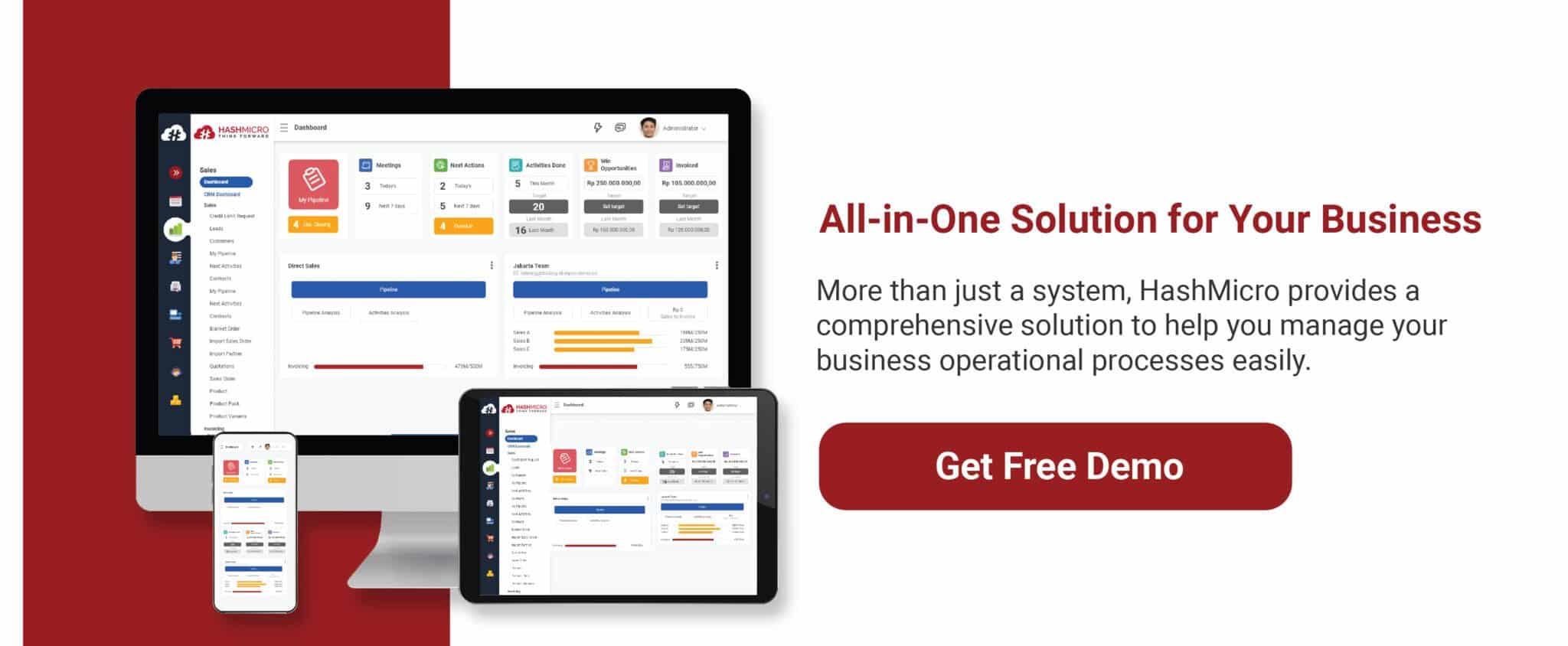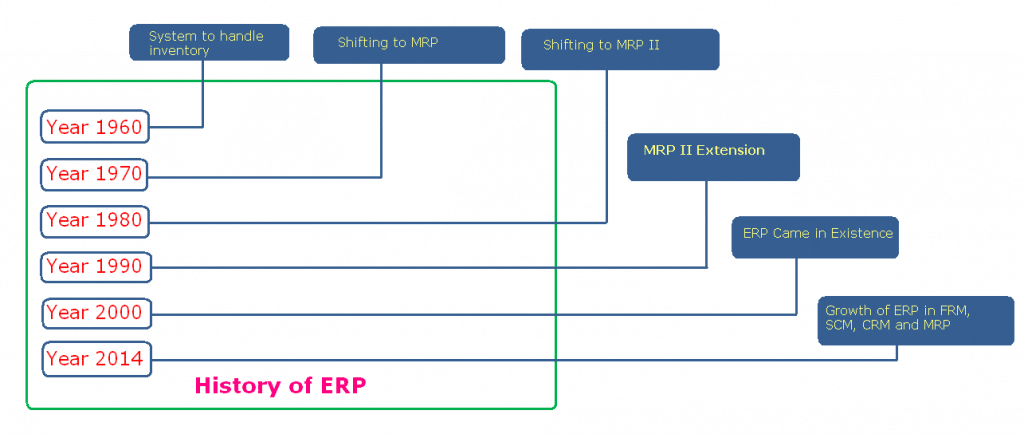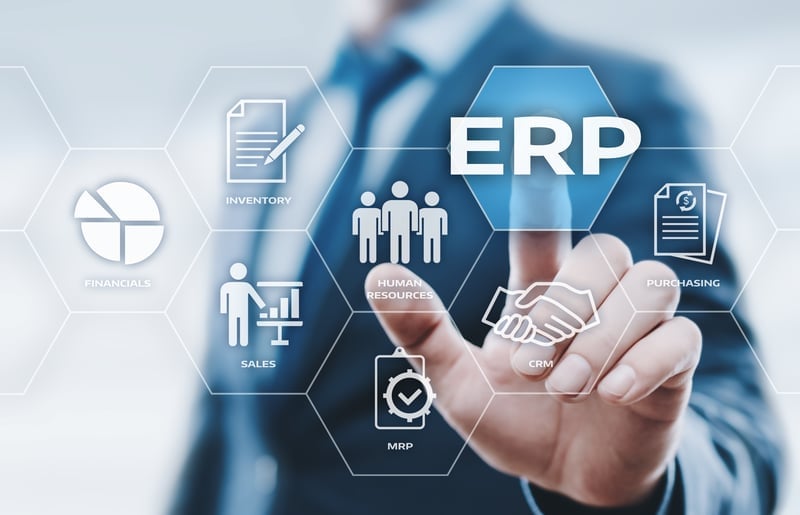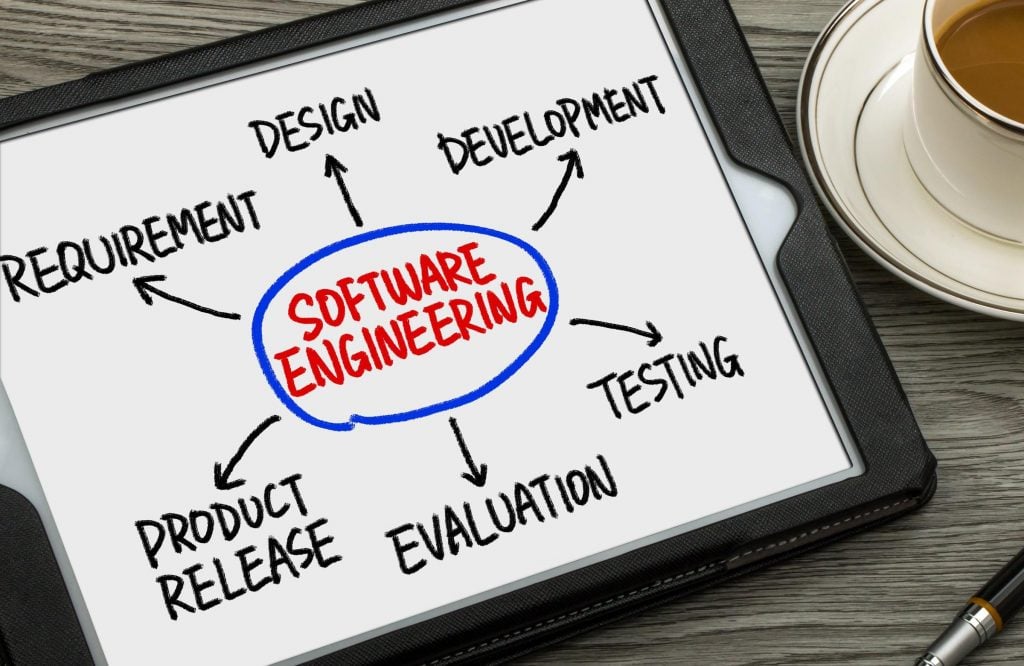What is ERP and Why is It Important for Businesses?
What is ERP software? In short, ERP (Enterprise Resource Planning) is a set of software that functions to manage and integrate various operational activities in a business. One of the benefits of an ERP system is that it can keep all your company data, from the employee, financial, and other important information, with the best security system. Doing manual daily business activities may be challenging. Thus, it allows companies to automate their business operations.
In the past, cloud-based ERP software was a system that was more widely used by large-scale companies (enterprises). Still, now it has also become popular among SMEs. In this article, we will discuss the meaning of ERP systems in more detail, complete with a brief history, types, and uses for your business.

Mục Lục
Table of content
So, What is ERP?
An Enterprise Resource Planning system is a business process management software that manages and integrates day-to-day business activities, such as financial, procurement, production, project, human resource, and other activities. It provides real-time and accurate information that helps stakeholders make sound business decisions based on the data generated.
ERP system eliminates duplicate data and provides data integrity by collecting a company’s shared transactional data from multiple sources. Companies can adjust their needs during a large selection of ERP software before choosing the best ERP software for their business.
A Brief History of ERP (Enterprise Resource Planning)

A Brief History of ERP
The term ERP was invented in 1990 by the Gartner Group, but the concept has actually existed since the 1960s. At that time, it was only applied to inventory management and control in the manufacturing industry. Software engineers created programs to monitor inventory, reconcile balances, and report status. By the 1970s, the program had evolved into Material Requirements Planning (MRP) systems for scheduling production processes.
In the 1980s, developing MRP was to cover more manufacturing processes, thereby converting it to MRP-II or Material Resource Planning. By 1990, the systems had more functions beyond inventory management and other operational operations to back-office functions such as finance, engineering, project, and human resource management.
Along with the emergence of the Y2K bug and the imminent introduction of the euro, companies in the 1990s rushed to update their existing systems. Many chose to completely revamp their strategies by adopting ERP solutions. By 1998, NetSuite was founded to create a system that works across a company and operates via the internet.
In the 2000s, Gartner Group re-developed ERP by issuing Enterprise Resource Planning II. The systems offer a high degree of flexibility that allows users to manage their businesses anytime and anywhere. Nowadays, cloud-based ERP systems are increasingly in demand among SMEs due to the higher levels of mobility and affordable prices.



Which Industries Can Benefit from ERP?
Although ERP was only for the manufacturing industry before, the software has now expanded to various other sectors such as service, education, retail and wholesale, real estate, food and beverage, health, and even government.
Every organization manages employees, buys products or services, sells or distributes something, and accounts for finances. ERP software will allow organizations from all industries to integrate and manage these essential functions.
Why is ERP Important for Your Business?
Have you ever wondered why so many businesses are looking for Enterprise Resource Planning system solutions? What do they need them? According to the latest statistical data, 81 percent of companies are in the process of implementing ERP or have successfully implemented it. They would never consider implementing an ERP system in the first place if the systems don’t have advantages for their businesses. Let’s break down the benefits of an ERP system for your business.
1. Optimizing efficiency
ERP systems simplify a variety of business processes that take a lot of time and effort when done manually. Businesses can now do repetitive tasks such as tracking inventory, assigning tasks to employees, monitoring working hours, distributing salaries, and generating financial reports automatically.
By automating complex processes, your employees can focus more on their core deliverables without bugging each other. For example, the marketing team can generate daily web traffic data without having to request it from the IT team, or the accounting team can generate sales-related reports without relying on sales managers.
ERP systems also provide fast data access for managers and stakeholders in the company. Decision-makers can monitor key performance indicators throughout the company through the dashboard. All required data can be generated in real-time.
2. Increasing team collaboration
Cross-departmental collaboration is a crucial and often necessary part of a business. A Saas ERP system breaks down barriers between departments in a company. With the data stored in centralized and consistent ERP software, a department can access data from other departments. SaaS or cloud-based ERP can extend existing inter-team collaboration across multiple offices in different locations over the internet.
3. Reducing operating costs
ERP systems also help companies save on operational costs. Since most operational activities are automated, various interruptions, delays, and breakdowns can be adequately anticipated. The complex work can be completed more quickly, thus reducing lead time. Companies can also reduce labor because ERP solutions take over various day-to-day tasks.
4. Improving Data Security
ERP solutions have firewalls and restriction controls to prevent data breaches. The system keeps all the data concentrated on one point to easily monitor the access points. Admins responsible for managing company data can provide limited access rights to employees. For example, HR managers can hide some critical data only for themselves and stakeholders while granting employees permission to view their financial data.
Admins can also quickly deactivate the access of laid-off employees and grant access to the new ones. ERP solutions also show user activities, so the admins can quickly identify unauthorized actions or suspicious activity patterns in the system.
5. Making Realistic, Accurate Forecasts
One of the most crucial things for business advancement is making accurate forecasts. Stakeholders rely on reports to make forecasts that will ultimately affect their decisions. Therefore, businesses need to get real-time, complete, and consistent reports, which can be facilitated with comprehensive ERP software.
ERP reporting tools use sophisticated filters and analytics that can filter inconsistencies in the data. The system also ensures that the data obtained is generated in real-time. Accurate business reports will help stakeholders make the best decisions for their business.
How To Decide If or When Your Business Needs Enterprise Resource Planning System
Every business is unique and faces different challenges. Now the question is, how do you know that your business needs ERP? The following parameters indicate that you should consider using an ERP system now.
- The staff spend too much time on tasks that shouldn’t be done manually
- You don’t have quick and easy access to the data you need to make business decisions
- The business work with various vendors or suppliers across different regions or countries
- You have many different applications that you have implemented for your business over the years, but they are not connected to each other
- You are unable to monitor your inventory level every day
- Needs too much time for searching for information, trying to increase productivity and efficiency, and integrating various functions in your business
- Your staff can’t easily collaborate or share information with each other
- Critical business data and information can’t be accessed when you are outside the office
- You address problems when it’s too late; in other words, you can’t be proactive when it comes to identifying issues in your business process
If most of the points stated above are relevant to you, it’s time for you to immediately find the right ERP solution.
Types of ERP Deployments


There are several types of ERP developments trending in the market today. To avoid confusion when ERP vendors offer the solution to you, try to learn the following three popular kinds of ERP developments.
1. On-premise ERP
On-Premise ERP is locally on your company’s hardware and servers IT staff manage it. The initial investment for conventional ERP is pretty high because your company needs to purchase servers to run the system. You also have IT staff responsible for managing and maintaining the system. In addition, upgrading an on-site ERP system need a lot of effort since your IT team will have to start customizing from scratch again, and you will lose your previous customizations.
Although it requires a lot of costs and effort, conventional ERP solutions are still in great demand as these systems allow companies to handle their own data to ensure safety. In addition, on-site ERP systems also offer ease of customization and give more control over the implementation process. Conventional type solutions are usually more popular among large-scale companies.
2. Cloud ERP
Cloud ERP or SaaS ERP is a type of ERP deployment that allows companies to manage centralized data via an internet connection. In other words, your vendor is responsible for this system’s smoothness and monitors it through the backend. Users only need a username and password to be able to access the system.
The investment cost for the cloud-type system is much lower than that of the on-premise ERP. However, users are subject to overhead costs (usually monthly) for as long as they use the system. Cloud-based ERP solutions are more popular among small and medium-sized businesses. The advantages of cloud ERP are as follows:
1. Faster deployment
Unlike on-premise ERP, cloud enterprise resource planning doesn’t require additional hardware, so your company doesn’t have to waste time procuring and installing IT infrastructure. Cloud-based ERP installation time typically takes 3-6 months, while a conventional system implementation requires at least a year.
2. Periodic system updates & upgrades
Above all, cloud ERP upgrade is continually by the provider. In addition, you can feel assured that you always use the latest and most up-to-date enterprise resource planning system. But, when you use a conventional ERP system, you need to update and upgrade the system regularly by removing any adjustments that the company used before.
3. High-level mobility
Cloud ERP allows you to keep an eye on your business anywhere and anytime. Since it’s website-based, users can access the system through supported browsers. You won’t have to come to the office just to view the various data you want because you can access it through your mobile phone or tablet.
3. Hybrid ERP
Hybrid is a combination of on-premise ERP and cloud ERP. It serves as a logical solution for many companies who want to upgrade their current conventional ERP systems without changing them. In addition to separating functions between traditional and cloud-based ERP software, Hybrid ERP also helps companies integrate or add functionalities to their existing ERP systems at minimum cost.
Basic Modules of an ERP System


You have found the answer “what is ERP?”. Now, you need to know the basic modules of any ERP system.
1. Accounting
The accounting system manages the whole incoming and outgoing cash flow. In other words, it also helps companies handle various accounting transactions such as expenditures, balance sheets, general ledgers, bank reconciliation, budgeting, tax management, and so on. Most importantly, the company can make financial statements with just a few clicks in this module.
2. CRM
CRM (Customer Relationship Management) module helps improve sales performance through better customer service tools & build healthy relationships with customers. It also helps companies manage & track detailed information about their leads and customers, including their communication history, calls, meetings, past purchases, etc.
3. HRM
HRM (Human Resource Management) module helps improve the efficiency of the HR department. It helps companies manage employee details such as performance appraisals, job descriptions, skills, attendance, leave, etc. Payroll Management is one of the most essential sub-modules in the HRM module that manages payroll, travel costs, and reimbursements.
4. Sales
This module handles the sales workflow such as sales inquiries, quotations, sales orders, and invoices. The integration of Sales and CRM modules can accelerate the sales cycle and generate greater profits for the company.
5. Inventory
The purpose of the inventory module is to track and manage inventory in a company. In addition, it also includes monitoring inventory levels, scheduling orders, forecasting purchases, and generating inventory reports. A great ERP system allows inventory integration with barcode or SKU scanners. The inventory module is more effective if integrated with the purchase module.
6. Purchasing
This module manages the processes involved in the procurement of goods. These include supplier listing, quotation requests and analysis, purchase orders, goods receipt notes, and stock updates. This module can be integrated with the inventory module for optimal stock management.
Purchasing software may undoubtedly help your company’s purchasing management by allowing you to order things ahead of time rather than waiting for stock to run out. Furthermore, the order will be made automatically when the stock meets the minimal criteria. As it is supplied with important papers while performing transactions, the availability of this application may also prevent the loss of orders for items that do not match the details.
7. Manufacturing
This module improves efficiency in manufacturing processes, such as; product planning, material routing, daily production monitoring, and Bill of Materials. An advanced ERP system allows the manufacturing module to be integrated with barcode or RFID scanners.
Manufacturing systems also benefit from allowing producers to adapt current features or add new modules as needed. Examples are purchasing modules, accounting, human resource management, supply chain management, and other areas. As a result, you will be able to more readily assess the overall efficacy of the equipment at any moment using real-time reporting capabilities.
Things to Consider When Choosing an ERP Software
As an essential part of a business, you cannot choose ERP software without consideration. Every company has different needs compared to others. So, here are some considerations when selecting the right enterprise resource planning system for your company.
1. What your business needs
Every company has different challenges and needs. Good ERP software can be tailored to the unique needs of every business. Make sure you understand your business’s challenges and the solutions you expect from your resource planning software. Explain all your needs in detail to your vendor so that they provide you with an enterprise software system with the specifications and features that meet your requirements.
2. Vendor viability & references
Find out detailed information about your vendor, including their experience in providing ERP solutions for various businesses. Who are their clients? In which industries their clients are engaged? How long has the vendor been operating? Don’t forget to request testimonials from each of their clients. If necessary, ask their clients directly regarding their results from using the software, including their relationships with your vendor.
3. Support
When you talk to an ERP vendor, you shouldn’t forget to ask about the support they provide. Support is a crucial element in every stage of a project, consisting of; requirement analysis, project planning, implementation, configuration, training and mentoring, and post-implementation. Make sure that your vendor can be easily contacted when your Enterprise system is experiencing issues or when you have any inquiries related to the system.
4. Integration & customization
Good ERP software allows its users to easily integrate and adjust them. You may not need a lot of integration or customization now, but your business needs can change at any time. You might want to add some modules or reduce them in the future. As your business gets bigger, the conditions become more complex. So, make sure that the Enterprise software you choose can easily be adjusted to the scale of your business.
5. Implementation process
One of the main factors that you need to consider when choosing ERP software is the implementation duration. The software implementation period usually depends on how many adjustments need to be made. The more customization, the longer the implementation process. The implementation of cloud-based ERP tends to be faster and more straightforward than the conventional one. So, choose the most appropriate and beneficial Enterprise Resource Planning system deployment for your company.
6. Budget calculation
Software that offers lower costs may be able to minimize your company’s expenses. But on the other hand, relatively inexpensive software may require a longer implementation process, and the result may be less effective. However, suppose your company’s management needs are pretty significant. In that case, your company also needs ERP software that is certainly capable.
Conclusion

Amid increasingly fierce business competition, you must be able to keep up with the ever-changing technological trends. Running your business with manual or outdated methods will only leave your business behind. If other business owners have automated their operations, why haven’t you?
The software helps simplify various complex operations, increase efficiency, reduce costs, and optimize the productivity of your business. It applies to companies of all sizes; small, medium, and large.
Now that you have learned what ERP software is, from its history, the advantages, the deployment types, the standard modules, and factors to consider when choosing it. The next thing to do is identify all the challenges your business is facing and the solutions required.
If you are not sure of the features you need in an ERP system, don’t hesitate to discuss it with the right ERP solution provider. HashMicro provides free consultations for those looking to implement automated solutions to streamline their business operations. Click here to find out about the consultation methods offered.















![Toni Kroos là ai? [ sự thật về tiểu sử đầy đủ Toni Kroos ]](https://evbn.org/wp-content/uploads/New-Project-6635-1671934592.jpg)


